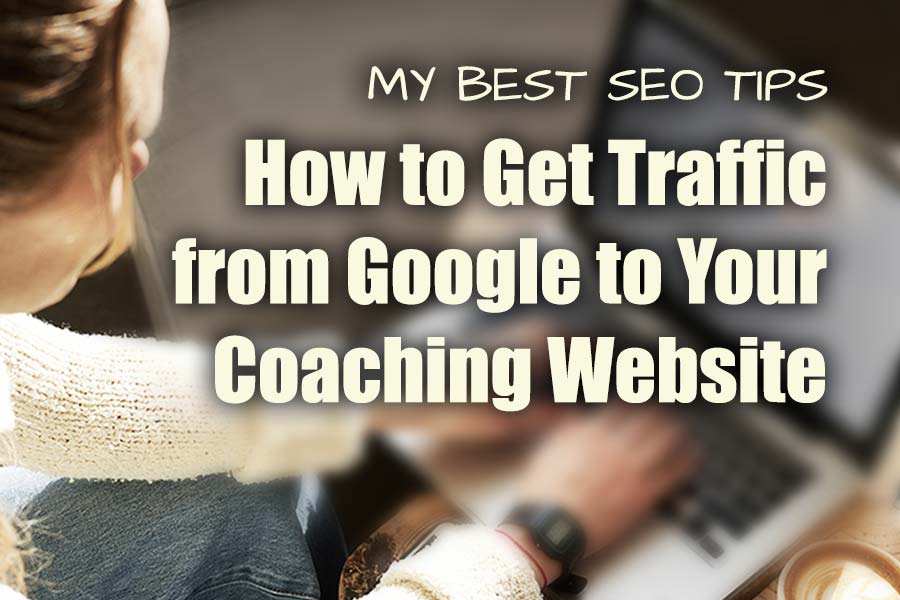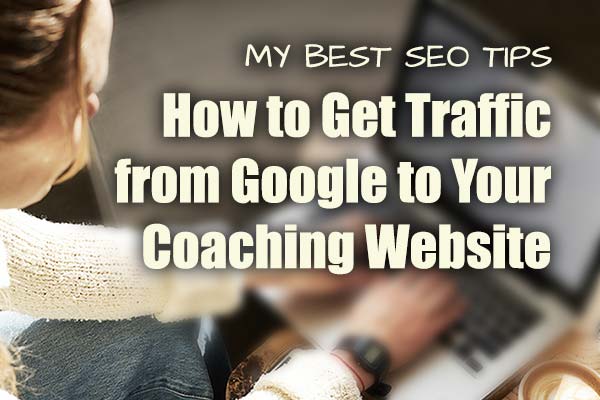Best SEO Tips for Traffic from Google to Your Coaching Website
Ok, Ok, Ok, this whole world of SEO can get hairy, confusing, and chaotic very quickly. So, I’m going to keep it simple so you can get the idea and start to apply it to your coaching website.
In this post, you’ll get a crash course on my 3 best SEO tips for getting traffic from Google:
- A tip on choosing the best keywords for coaches
- A tip on website construction / usability which you might not think Google cares about
- What backlinking is and why that matters, and how you might go about it
Big Kenn Ask: I love teaching and I doubly-love hearing from readers. I’ve got a little question at the bottom that will help you solidify your learning.
SEO means search engine optimization which means “doing some work” to make your website rank high on search engines — for which we’ll only care about Google (are they any others? ;D)

When done well, your website will appear high on the search engine results page (not in the paid ads area which people know are advertisements). You want to be found for the keywords that are relevant to what you do.
Getting visitors from Google is amazing because those people are actively seeking help. They are intentionally looking for a coach or someone who can help with their needs.
In marketing speak, those people are “qualified buyers.” They aren’t people who randomly clicked on an ad that happens across their screen. People sent from Google are very motivated to get help.
In fact, most of my website design for coaches business here at CoachingSitesThatWork.com was built via creating content that ranks well in Google.
Ok, so let me give you my three best SEO tips — actually, these are robust strategies to get traffic from Google to your coaching website, so you can get coaching clients online.
My best SEO tips …
Best SEO Tips #1. Get the Right Keywords Into Your Content, And Do It Smoothly
It’s all about keywords. That’s how Google organizes it’s database.
People enter terms and phrases into Google and out comes a list of results.
So, if you want your website to show up in those results, you’ll need to pay attention to keywords — specifically the keywords that pertain to what you do for which a person would type in.
So, you’ll need plenty of good content with your keywords in it.
Some key points about doing this right:
- Don’t stuff keywords in excessively as Google will be able to spot this.
- Also, words that repeat too often will hurt readability, which will scare away visitors
- Definitely research phrases to find ideal ones — the “keyword planner tool” by Google is handy one and you’ll need to set up a Google Ads account to use that tool, which you can do at no cost. There are other keyword planner tools out there.
- Longer phrases 3, 4, and even 5 words phrases are good because there will be less competition – like small business coach New York instead of a business coach.
- Think of a phrase for your entire website as well as page-specific phrases.

Kenn Tip From the Web Design Trenches! One great way to find keywords that coaches should use is to think about the struggles, pains, and challenges your bestest clients have. People love to search for answers to their toughest problems.
Here are special places to get keywords that’ll work for coaches – Keyword Sources for Coaching Websites.
To get this into action, pick out your coaching topics, and think of the keywords people will use that could lead them to your website. Then write and organize your content around that.
For example, if you’re a money coach, you could have topics like “get out of debt” “personal budgeting” “how to save money” “how to manage money” “money mindset” and, over time, create blogs or article around those topics.
Strategic Note! Blogging is an amazing way to get good content with well-chosen keywords onto your website. And Google loves fresh blogs. There’s a lot about this in The Coaching Website Guide, worth a look if your primary aim is securing new one-on-one, paying clients.
Best SEO Tips #2. Make Your Website Easy In Every Way Possible
Google provides great results simply and quickly to its users – the searchers. That’s why Google thrives.
If Google started to suck at providing good results, was slow, and sent you to crumby websites, then people would stop using Google, and Google would die.
So, Google favors websites that are “easy” over ones that are difficult. And you can probably guess that this means the information on your website must be:
- easy to access on various browsers and devices, internet speeds
- easy to read for people which means viewable font sizes, logical headings, an enjoyable writing style, and logical organization
- opens up fast, even on lower speed situations like mobiles or on planes
If your website is slow, clunky, crashes, buggy, hard-to-read, or hard-to-use in any way, Google will frown upon it and your rankings will suffer.
Simply put, the better the experience a person has at your website, the more kudos you gain with Google — and that means more visitors for you.
Some doable steps:
- Test your website speeds. I like using pingdom.com. Make sure your site runs fast all around the world.
- Make sure your site looks good on various browsers (Chrome, Safari, etc) and on mobile devices. Test it on your own phone.
- Avoid putting links on your site that don’t relate to your content.
- When people share and tweet your website or pages, you get pluses for your rankings, so as you build up much more content, consider going social with likes and shares.
- Call your friend in another country and ask them to have a look at your site.
Remember, easy.
Best SEO Tips #3. Build Backlinks from Credible, Relevant Websites — Especially Ones That Clients Frequent
There are two directions a website “link” can go:
- They can go FROM YOUR WEBSITE to another website. This is called an “outbound link” because it takes visitors away from your website. This is what most people think of when they think of the word “link.”
- They can go FROM ANOTHER WEBSITE to yours. This is called an “inbound link” because it brings people “in” t.o your website. It’s also called a “backlink” to be different.
In chicken scratch, it looks like this …

What’s important to know is that you can easily put a link on your website to another website (an inbound link) because you own your website.
BUT, you cannot put a link on another website to yours (an inbound link or backlink) because you do not own or have access to that other website.
And can you guess which link Google likes to see when it’s evaluating your website?
Yes, you guessed it – backlinks!
It’s like being in high school again — all that annoying popularity stuff.
Well, maybe it was annoying for me because I wasn’t in the “in crowd.” I sorta danced to my own tune, but that’s a story for another day.
Here’s how backlink is like being back in high school:
- In high school, when you say someone else is cool, it does nothing for your personal cool rankings but does boost theirs.
- The more that other students claim that you are “cool” the cooler you become.
- The “in crowd” students, with very high cool rankings, will impact your cool score more if they spread the word that you’re cool.
As you can see, the more backlinks you get from other websites (especially the cooler ones!) the better you’ll do on Google.
And that’s the high-school effect on your Google rankings. Let’s call this the “Sch-oogle Effect” for fun and possible reference down the line 😉
A simple example of backlinking for a coaching website …
One way to do it — a great way for coaches — is to publish an article on another well-known well-respected, high-ranking website.
For example, if you’re a relationship coach, you could write an article for Psychology Today and put your website address in the author box they provide you.
That is a backlink because it goes from Psychology Today back to your website.
You’ll need to apply and get approved to do this (this is work). But, Google will value your website more when it sees the link.
Here’s another example of one of my backlinks…
I wrote a guest post, Three Ways to Get Coaching Clients to Engage with Your Website, on The Coaching Tools Company website.
For my article, there’s an author bio box that goes with it. In that box is a link back to my website which is “https://coachingsitesthtawork.com” as shown below:

The hard thing about backlinks is to find places to get them online and then getting permission from the site owners to add yours.
So, remember, backlinks are votes of confidence about your website in Google’s eyes.
Applying My Best SEO Tips Will Take Work — And Therein Lies The Opportunity
SEO, as much as folks would like to pay $29.99 to a cheeseball service provider and have it done, requires work if you want to succeed.
As you can tell, simply getting backlinks isn’t going to happen without permission from the “other website” and to get that permission you can’t just pay few bucks to get. It takes work.
But, that work can and does pay off big time because your competitors are probably not going to make the effort.
So with some diligent content work, back-linking efforts, and maximizing usability, you can win Google over.
And that traffic can last for months to years — mine does 😉
And lastly, to solidify your learning …

I love teaching and hearing from you will make my day.
So, let’s make sure this stuff is sinking in.
In the comments, please tell me, What’s one key take away for you?
[fblike]


I appreciate your clear explanations and simple, doable action steps. I’m always asking myself, what can I do that gives the most bang for my buck or the best outcomes for my efforts.
Your action tips rank highly.
Thank you. Simple, clean and gives a taste of the task ahead! (ok, a little bit daunting too…)
I love your analogy of high school popularity! what a brilliant way to explain it. Thanks for the article.
If as an ADHD coach I have professional listings on other sites like CHADD, ADDA, or PAAC (all ADHD and ADHD coaching organizations) are those backlinks, as far as google is concerned?
You betcha! As long as those links are able to be seen by Google – that they are public.
Those are great to have as they are highly related to your terms.
Think about ADD / ADHD online sites/articles places as possible backlinks as well — if you plan to publish.
You can do it Aviva 😉